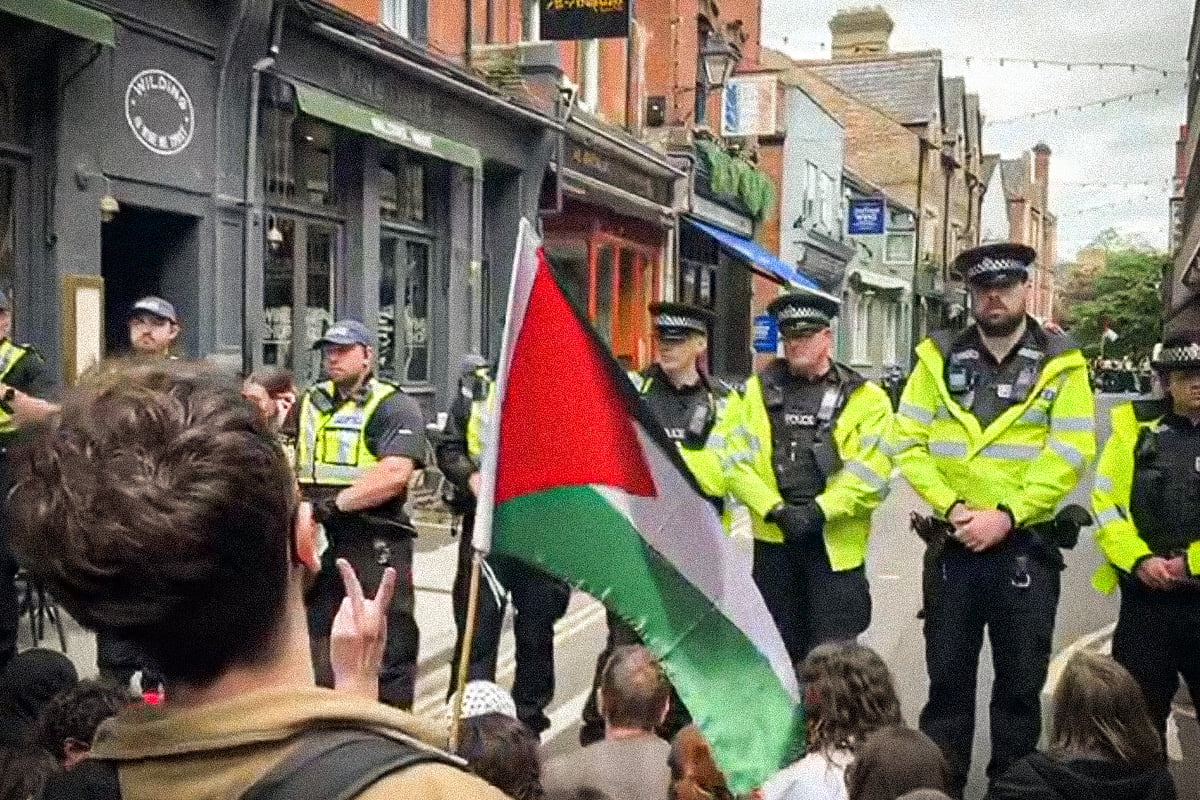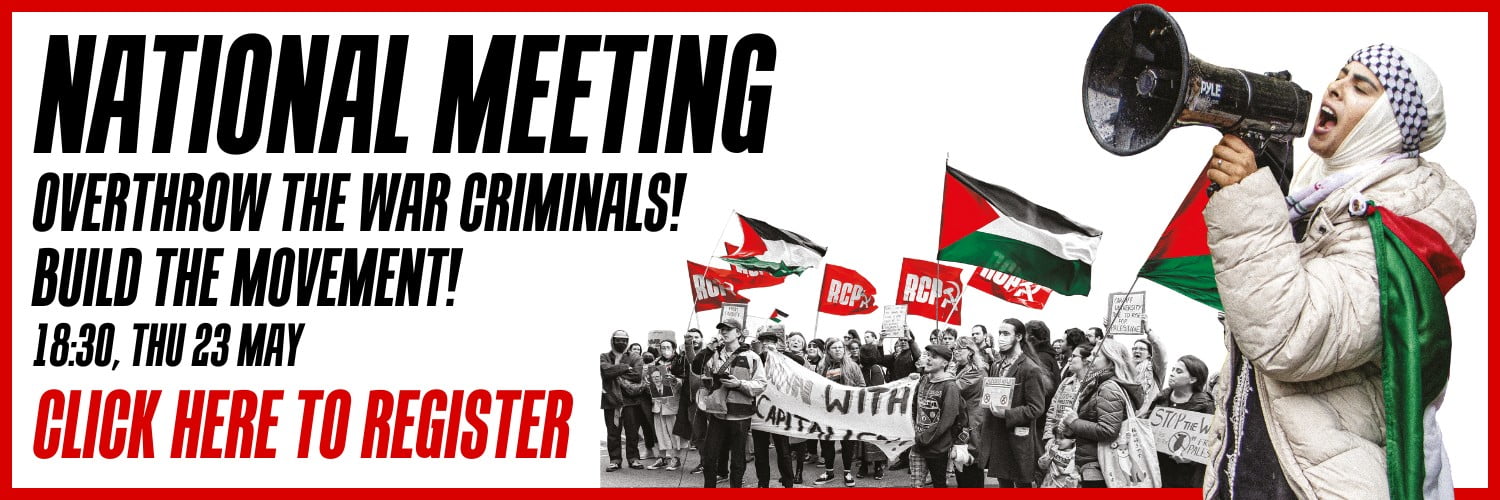This morning, a student occupation in Oxford was shut down by the police. The occupation had begun this morning in response to the university refusing to open negotiations.
Students held a sit-in in the Vice-Chancellor’s office, and were promptly met with police repression. Forty police officers showed up, evacuating the staff, but refusing to let the students out.
By the time a counter protest could be called, 16 students had already been arrested and held in armoured vans.
I just received this video of police in Oxford using BIKES to beat back peaceful protestors – so that they can arrest 16 student occupiers @UniofOxford
Shame pic.twitter.com/SQlDkq4Era
— Laurie O’Connel (@Laurie_eee) May 23, 2024
In an astounding show of solidarity, over 300 students surrounded the building, blocking all exits and refusing to allow any more arrests to take place. Police repression was met with chants of “forty thousand people dead, you arrest students instead”.
Protestors sat opposite police vans, refusing to allow them to leave. In response, the police used bicycles to beat back protestors, physically removed them from the road, and even removed one student protester in a stretcher!
Oxford police are continuing their violent assaults and arrests of peaceful protesters, here seen taking away a student on a stretcher. pic.twitter.com/T04edYPfu9
— Oxford Action for Palestine (@OxAct4Pal) May 23, 2024
This disgusting behaviour by the Oxford university administration speaks volumes. They would rather arrest their own students then even acknowledge the depths of their complicity with the ongoing genocide in Gaza.
Lessons
Students, staff, and local workers in Oxford must do everything they can to fight back through organising mass resistance, and gathering greater numbers to defend the main encampment.
But across the country, the encampment movement must also discuss the lessons of today, and consider how best other encampments can be defended from such attacks.
Only a few days ago, the encampment at Queen Mary University in London was also attacked by two Zionists, who tore down tents and sprayed urine on protestors, whilst security did nothing to prevent it.
The government – currently in freefall over the snap election – has been posturing to attack the entire movement. The Revolutionary Communist Party (RCP) – and anyone else standing up against the warmongers – have been tarred as antisemites, whilst they threaten to ban groups such as Palestine Action for organising ‘illegal’ protests.
And the movement must learn the lessons of the US and Canada, where police brutality swept away whole encampments and led to thousands of arrests.
Escalate
Without any strategy, it is possible that layers of the movement could be frightened into packing it down, and leaving early in the face of such repression. This is especially the case where the universities seem prepared to give some concessions.
But this would be a defeat for the movement at large. In the face of the thousands being killed in Gaza, and our own governments’ complicity, the movement must not give way to such pressure.
Instead, it should come up with a clear plan of escalation, one that can continue through the summer and into the autumn term.
But what kind of escalation? In encampments up and down the country, these questions have been discussed. In Cambridge and Oxford, second occupations have been opened up to put further pressure on the university.
Whilst bold, this strategy carries certain risks. If organised without mass support, and fresh layers to fill the camps, it can simply split forces and isolate the camp. This leads to scenes like the ones we have seen today, where the building occupation had only a few dozen students and was not supported from the outside with great numbers.
By contrast, in Cambridge, where the Senate House lawn was occupied only a day before graduation ceremonies were due to take place, the university was also met with a large protest outside its gate.
View this post on Instagram
Hundreds of students and workers from across the city were mobilised, including delivery riders, local shop workers, and university staff, to support the occupation. This show of strength certainly made the university think twice about responding in kind, and in fact forced them into negotiations.
A similar, and even more instructive, lesson comes from the University of Leiden in the Netherlands. Here, the students occupied an entire floor of the main university building and shut it down for the entire day, remaining there for seven hours. Simultaneously they organised a sizable solidarity protest outside.
View this post on Instagram
When the riot police were sent into the building, the protest outside counter-kettled the police blocking the exits, and every single person involved in the occupation got out and merged with the larger protest crowd. There was not a single arrest or injury. The riot police could do nothing when they emerged from the building to find a protest of over 1,000 workers and students on the street.
These lessons show the importance of mass struggle, connecting the encampments with the wider community, and calling large demonstrations rather than relying on conspiratorial techniques with small groups of activists.
Broadening the movement
Of course, you cannot have 24/7 mass protests protecting secondary or tertiary occupations. But there are other ways of broadening out the movement beyond simply protests.
The movement must continue to grow. University students should campaign to bring as many new students into the encampments as possible, flyering on campus, holding lecture shout outs, and reaching out by word of mouth to bring new layers into the movement.
Further to this, encampments must build relations with trade unions and workers across the city, to ensure that they cannot become cut-off and isolated.
In many parts of the country, this is already being done. In Edinburgh, university staff organised a walkout in support of the encampment. In Cambridge, comrades of the RCP have built amongst delivery riders and workers in the local shopping centre to organise a walkout and a general assembly.
Nakba Day student/staff walkout at Edinburgh Uni. Organised by the students fighting to force the university of Balfour to divest from apartheid and genocide. #Nakba76 pic.twitter.com/3cKyqYZ3Qv
— Jade (@JadeEckhaus) May 15, 2024
Similarly in Queen Mary’s University, a general assembly has been called, involving local communities, health workers, trade unionists, and students. The aim of this assembly is to democratically decide on the demands for the movement, as well as to build broad support for the encampments. This will allow it to spread into the local area rather than isolate it to the university campus.
This is necessary not just to defend the movement, but also to help it achieve its wider aims. If we want to kick out this rotten government and British imperialism, we will need more than just student occupations.
It is the workers who have the power to shut things down; if they occupied their workplaces, and demanded the opening of the books, this would represent a serious threat to the British establishment and strike a real blow against imperialism.
What is more, the encampment movement must be connected up nationally. We need a national strategy to learn the lessons of all of this and to push through the summer months, where the universities are clearly hoping that the students will simply pack up and go on holiday.
Instead, we must use this time to plan and build our forces, preparing to go even further on the offensive this autumn; a strategy which will be discussed at a nation-wide meeting of activists tonight. This should also be linked to the upcoming election.
Both Sunak and Starmer unconditionally support the genocide, only a mass movement can oppose them.
What if the repression continues?
It is unclear if the events in Oxford this morning will be a one-off. But the encampments should be discussing what could happen if other students across the country are arrested for similar actions.
There is no cause for panic. But careful plans should be made.
Most encampments have received huge groundswells of support from the public and trade unions, including financial donations. This money should be kept aside as a fund to organise solidarity demonstrations, book rooms for meetings and general assemblies, and support any students or workers who face legal repercussions for their actions.
If the encampments are connected and in communication with each other, stronger encampments could also support weak ones in this way.
Encampments should organise teach-outs on the role of the state – what it is and how to fight it, emphasising the role of mass mobilisation.
To achieve all of this, decisive leadership is necessary. When faced with pressure, emergency decisions have to be made; to call a solidarity rally, reach out to contacts in the broader movement, and allocate funds and resources. There is no room for dithering.
Indecisiveness amongst leadership can provoke panic, and can even lead to layers of the movement becoming demoralised or scared off in fast moving situations such as the one we saw today.
As our American comrades explained, if the US encampments had been able to effectively coordinate and direct all of their work, democratically electing a leading body, they would have been able to spread faster and stand up against repression better.
Solidarity
Above all, the slogan of the encampment movement must be: an injury to one is an injury to all! Solidarity demonstrations and meetings must be organised across the country in response to the events at Oxford today.
Earlier this year, when a comrade of the RCP was arrested at a demonstration, hundreds were rallied from across London to the police station he was being held at, protesting until he was released.
The same must be carried out at Abingdon police station today where the Oxford students are being held, and at the university campus to show the administration exactly what we think of these disgusting measures.
I’m hearing that all 16 students who staged a peaceful sit-in at Oxford University admin offices have been arrested. Students are now marching to the HB Allen Centre, where the Conference of College is meeting. Students are demanding divestment from Israel and arms manufacturing pic.twitter.com/UcdH0x4cAH
— Madeleine Jane (@_MadeleineJane) May 23, 2024
If the movement is bold and resolute, we have nothing to fear. You arrest 10, we will come back with 1,000!







